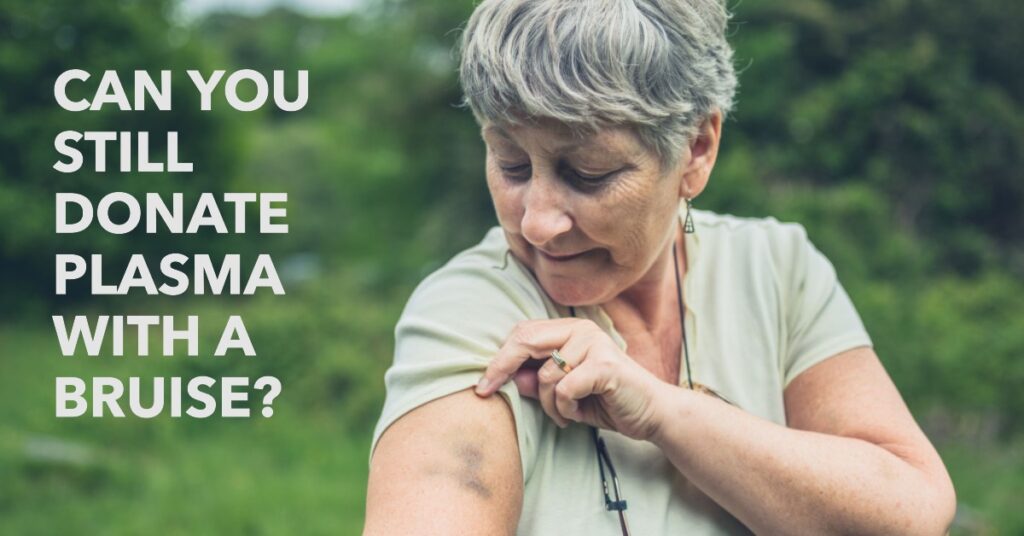
It was just another day at the gym when I accidentally bumped into a weight rack, leaving a massive bruise on my arm.
I had planned on donating plasma that week, but now I couldn’t help but wonder, Can you still donate plasma with a bruise?
In this article, I’ll clear all your doubts about: Can you still donate plasma with a bruise?
Can You Still Donate Plasma with A Bruise?

Whether you can donate plasma with a bruise depends on its size, location, and severity. Staff at the plasma donation center will evaluate your bruise and determine if it’s safe to proceed.
Always disclose bruises during the screening process to ensure donor and recipient safety.
Similarly, if you’re wondering Can You Donate Plasma with Low Iron, it’s essential to consult with donation center staff.
How Bruises Affect Plasma Donation
A bruise occurs when blood vessels beneath the skin rupture, causing blood to leak into surrounding tissues. If a bruise is near the site where the needle will be inserted for plasma donation, it may cause difficulty in finding a suitable vein or increase the risk of complications.
Additionally, a large or severe bruise may indicate an underlying medical issue, which could affect your eligibility to donate.
Why Won’t They Let You Donate Plasma with A Bruise?
There are several reasons why a plasma donation center may not allow you to donate if you have a bruise:
- Difficulty finding a suitable vein: A bruise may make it challenging to locate a healthy vein for needle insertion.
- Risk of complications: Donating plasma with a bruise could increase the risk of infection or other complications.
- Underlying medical issues: A bruise may be a sign of a more severe medical problem that could affect your eligibility to donate.
Learn more about the potential risks of donating plasma to ensure a safe experience for both donors and recipients.
How to Determine if Your Bruise is Safe for Plasma Donation
The color of a bruise can provide insight into its age and severity. A newer bruise will typically be red or purple, while an older, healing bruise may be green, yellow, or brown. Generally, older bruises are less likely to interfere with plasma donation.
What to Do if the Bruise is Not Safe for Plasma Donation
If your bruise is deemed unsafe for plasma donation, you may be asked to postpone your donation until it has healed sufficiently.
In the meantime, you can take care of your bruise by applying ice, elevating the affected area, and avoiding further injury.
Follow the plasma center’s recommendations and wait until they clear you to donate.
During the screening process, you might be curious about Why Do They Check Your Elbows when Donating Plasma; understanding this procedure can help you feel more prepared for your donation.
How to Get Rid of Bruises from Donating Plasma
Bruises from donating plasma are generally minor and will heal on their own. To speed up the healing process, you can apply ice to the area, elevate it, and take over-the-counter pain relievers as needed.
What Color Does a Bruise Have to Be to Donate Plasma?
For plasma donation, a bruise that is green, yellow, or brown, indicating it is older and healing, is more likely to be acceptable. However, there is no specific bruise color requirement for plasma donation.
What Happens if You Donate Plasma with A Bruise?
Donating plasma with a bruise can increase the risk of complications, such as infection or difficulty finding a suitable vein for needle insertion. It is crucial to disclose any bruises during the screening process to ensure the safety of both you and the recipient.
Be aware of the long term side effects of donating plasma regularly and consult with donation center staff to ensure a safe donation process.
FAQs on Can You Still Donate Plasma with A Bruise?
These are the frequently asked questions on Can You Still Donate Plasma with A Bruise:
Can I donate plasma with a bruise that is healing?
It depends on the size, location, and severity of the bruise. Consult with the staff at the plasma donation center to determine if it is safe to donate.
Can I donate plasma with a small bruise?
You can donate plasma with a small bruise.
Can I donate plasma if I have a bruise from the last donation?
If the bruise is still present from your last donation, discuss this with the plasma donation center staff. They will assess the bruise and determine if it is safe for you to proceed with another donation.
Conclusion
I hope you now have the answer to: Can You Still Donate Plasma with A Bruise? Know that depends on various factors, such as size, location, and severity.
It’s crucial to disclose any bruises to the plasma donation center staff, who will evaluate your situation and determine if it is safe for you to donate. If your bruise is deemed unsafe, follow the center’s recommendations and wait until it has healed before attempting to donate again.
